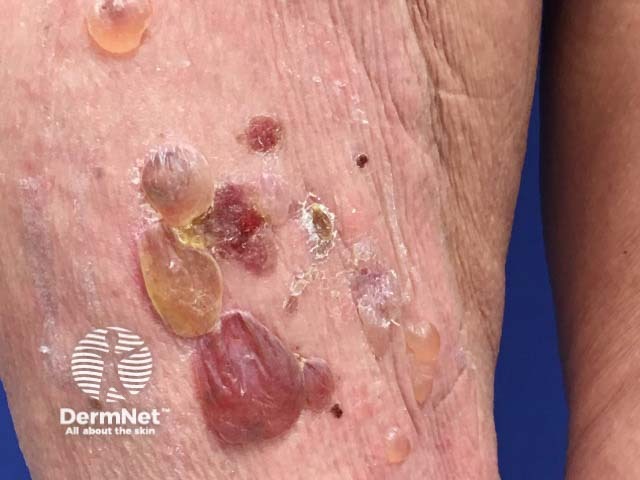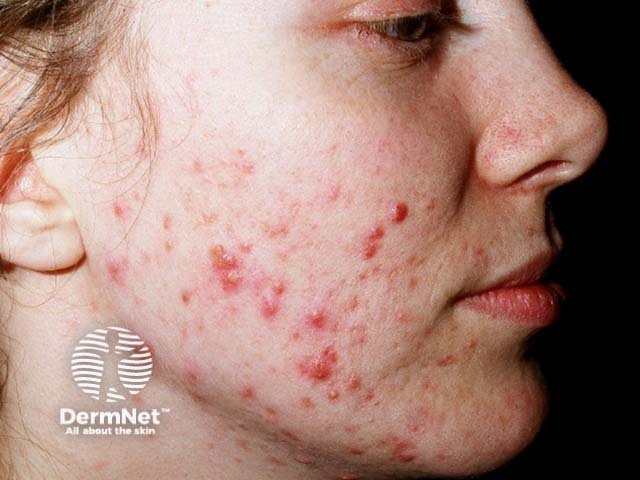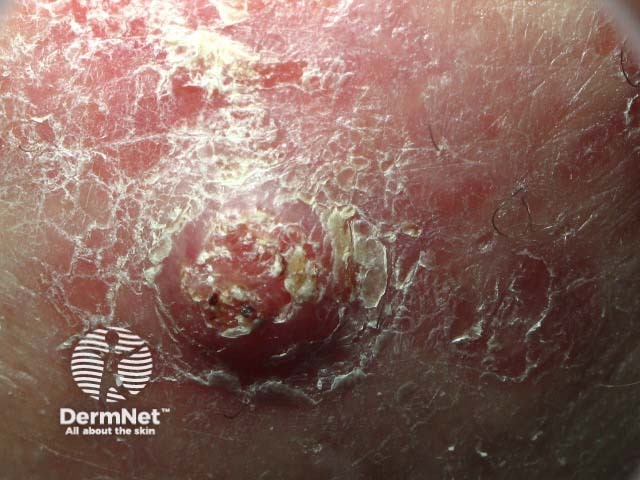Main menu
Common skin conditions

NEWS
Join DermNet PRO
Read more
Quick links
Author: Anoma Ranaweera, Medical Writer, Auckland, New Zealand, 2012. Latest update by A/Prof Amanda Oakley, Dermatologist, Hamilton, New Zealand, March 2018.
Introduction
How it works
Uses
Oral nicotinamide
Adverse effects
Topical nicotinamide
Nicotinamide, also known as niacinamide or nicotinic acid amide, is the water-soluble, active form of vitamin B3. It has been increasingly studied for many different indications in the field of dermatology, but more research is needed to clarify its value.
Nicotinamide is naturally present in small quantities in yeast, lean meats, fish, nuts and legumes. It is also often added to cereals and other foods. Oral nicotinamide is available as 20–30 mg in multivitamin combinations, and on its own as inexpensive 500-mg tablets. It has also been incorporated in many topical agents including sunscreens and cosmetic agents.
The broad clinical effects of nicotinamide may be explained by its role as:
Vitamin B3 is essential for good health; deficiency leads to a serious illness, pellagra. Oral nicotinamide can be used effectively to treat pellagra.
Nicotinamide used as medicine may benefit the skin in several different ways.

Bullous pemphigoid

Acne

Squamous cell carcinoma
A combination of oral nicotinamide and tetracycline appears to be a useful alternative to systemic steroids in the treatment of bullous pemphigoid. It is less toxic and safer than dapsone and prednisone.
In at least one open-labeled clinical trial comparing the combination of 500 mg of nicotinamide, three times daily, and 500 mg of tetracycline four times daily, with prednisone, in 20 patients with bullous pemphigoid, there were five complete responses and five partial responses, in the nicotinamide and tetracycline group compared with one complete response and five partial responses in the prednisone group, after 8 weeks of treatment. All five complete- response patients in the nicotinamide and tetracycline group remained disease-free during medication tapering over a 10-month follow-up period, while three patients in the prednisone group had repeated disease flare-ups with steroid tapering during the same period.
Placebo-controlled trials have suggested high-risk sun-damaged patients taking oral nicotinamide who have extensive actinic keratoses and cutaneous squamous cell carcinomas may expect a reduction in the number of new lesions over time. The evidence is inconclusive.
Oral nicotinamide is generally well tolerated in doses under 3 g/day. It does not cause flushing or gastrointestinal upset, unlike its precursor nicotinic acid. It has been reported to increase sweating, to raise blood sugar, and to cause hypotension.
Very high doses of nicotinamide may lead to nausea.
Certain nicotinamide metabolites had been linked to an increased risk of major cardiovascular events (MACE). However, a large retrospective cohort study found no increased risk of MACE in patients with nicotinamide exposure.
Nicotinamide, available in a topical cream, gel and oral forms (eg, Nicomide®), has been shown to be effective in clearing acne. In a controlled clinical trial, 4% nicotinamide gel was found to be as effective as the topical antibiotic 1% clindamycin gel in the treatment of acne vulgaris in 76 patients with moderate acne. The study concluded that the anti-inflammatory properties of nicotinamide might have contributed to its success in acne.
Nicotinamide also reduces facial sebum production. Sebum is responsible for facial shine and contributes to noninflamed comedones and inflammatory acne lesions. Results of a well-controlled clinical trial in Caucasian and Japanese women have shown that application of 2% nicotinamide moisturiser to the face for 4-6 weeks reduces sebum production with significant differences in facial shine and oiliness.
Nicotinamide gel is marketed as an over-the-counter treatment for acne in Canada, Australia, NZ, UK, USA and Ireland. If a twice-daily application causes excessive drying of the skin, one may reduce to once a day, or every other day.
The clinical signs and symptoms of rosacea include increased facial skin dryness, redness and sensitivity. In at least two studies, moisturisers containing nicotinamide have been shown to improve skin barrier function in rosacea patients, leading to diminished reaction to irritants including cleansers and cosmetics.
Nicotinamide serves as a precursor of nicotinamide adenine dinucleotide (NAD) and nicotinamide adenine dinucleotide phosphate (NADP), which are co-enzymes (facilitators of enzymatic reactions) essential for numerous metabolic pathways. These co-enzymes play a role in the metabolism of glucose, cellular energy production, and synthesis of lipids. The levels of NADH / NADPH (the reduced forms of NAD and NADP) decrease with age and topical nicotinamide appears to reverse the decline.
In multiple clinical studies, topical nicotinamide improved fine lines and wrinkles, hyperpigmented spots, red blotchiness, and skin sallowness (yellowing) as well as elasticity. One study showed nicotinamide to increase the skin's production of ceramides, which are natural emollients and skin protectants, thus improving skin hydration.
A double-blind, placebo-controlled, split-face, left-right, randomised 12-week study in 50 women evaluated the effects of 5% topical nicotinamide on various signs of skin ageing. The researchers reported topical nicotinamide resulted in significant improvement in fine lines/wrinkles, pigmentation, texture and red blotchiness. The study was sponsored by Proctor and Gamble.
Another study of 30 healthy Japanese females reported improvement of eyelid wrinkles after eight weeks of application of a cosmetic containing 4% nicotinamide.
Nicotinamide is well tolerated and often can be used by those who cannot tolerate topical retinoids or fruit acids.
Ultraviolet radiation (UVR) is the main risk factor for skin cancer development. The mechanisms by which UVR leads to cancer are complex including direct damage to DNA and effects on the immune system. Nicotinamide has been shown to enhance the repair of direct and oxidative DNA damage in human keratinocytes and human skin. It has the potential to prevent UV-induced immune suppression, shown in a study of volunteers with a positive Mantoux test (positive tuberculin sensitivity test). The Mantoux reaction can be suppressed by exposure to UVR. Nicotinamide reduced this immune suppression when it was applied either before or after exposure to UVR (simulating sunlight exposure).
In a randomised controlled clinical trial in 50 patients, 1% nicotinamide gel applied twice daily to the head, forearms and hands for six months reduced the mean number of precancerous actinic keratoses by 28%.
Nicotinamide does not work as a sunscreen (and does not prevent sunburn). It does not have antioxidant properties, but it may affect the complement cascade, cell energy metabolism, and apoptosis (cell death).
Approved datasheets are the official source of information for medicines, including approved uses, doses, and safety information. Check the individual datasheet in your country for information about medicines.
We suggest you refer to your national drug approval agency such as the Australian Therapeutic Goods Administration (TGA), US Food and Drug Administration (FDA), UK Medicines and Healthcare products regulatory agency (MHRA) / emc, and NZ Medsafe, or a national or state-approved formulary eg, the New Zealand Formulary (NZF) and New Zealand Formulary for Children (NZFC) and the British National Formulary (BNF) and British National Formulary for Children (BNFC).